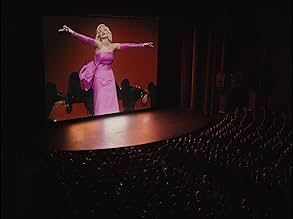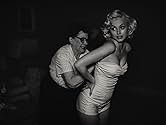The story of American actress Marilyn Monroe, covering her love and professional lives.The story of American actress Marilyn Monroe, covering her love and professional lives.The story of American actress Marilyn Monroe, covering her love and professional lives.
- Director
- Writers
- Stars
- Nominated for 1 Oscar
- 12 wins & 36 nominations total
- Director
- Writers
- All cast & crew
- Production, box office & more at IMDbPro
5.477.3K
1
2
3
4
5
6
7
8
9
10
Featured reviews
VILE: unpleasant, immoral, and unacceptable
In the 18th century Bedlam changed from a hospital and became a sideshow. People came to London and paid to watch the mentally ill.
In the 21st century Hollywood has reinvented this kind of horror show.
The makers of Blonde have made a vile, disgusting, unbalanced fiction about a real person who had a tragic childhood and dressed it up as a feminist lecture. It is amazing that anyone who suffered such an abusive early life could have reinvented herself and become a world wide star and icon. When she was "not well" instead of getting the medical help she needed Blonde was physically and mentally abused and fed alcohol and drugs so that she could continue to make money for the studios. Credit to star actors who turned down the role of Blonde having read the script.
BREAKING NEWS: Jan 2023 Blonde, has received the most nominations for this year's Razzies with eight nominations. It is up for worst picture and worst screenplay, while Andrew Dominik is up for worst director, and is named in the worst screen couple category. Blonde,is described by the Razzies as a film "movie-goers liked even less than critics did". Filter the reviews by 1 star ratings to see how true this is.
In the 21st century Hollywood has reinvented this kind of horror show.
The makers of Blonde have made a vile, disgusting, unbalanced fiction about a real person who had a tragic childhood and dressed it up as a feminist lecture. It is amazing that anyone who suffered such an abusive early life could have reinvented herself and become a world wide star and icon. When she was "not well" instead of getting the medical help she needed Blonde was physically and mentally abused and fed alcohol and drugs so that she could continue to make money for the studios. Credit to star actors who turned down the role of Blonde having read the script.
BREAKING NEWS: Jan 2023 Blonde, has received the most nominations for this year's Razzies with eight nominations. It is up for worst picture and worst screenplay, while Andrew Dominik is up for worst director, and is named in the worst screen couple category. Blonde,is described by the Razzies as a film "movie-goers liked even less than critics did". Filter the reviews by 1 star ratings to see how true this is.
Awful
As someone that knows nothing about Marilyn Monroe, I was excited to watch.
I ended up turning it off about 40 mins in. I knew this couldn't be real bc it was so trashy and dark.
I see now this is a fictional awfully made up story. They made Marilyn seem like trash. I can't imagine anything I watched being true.
I couldn't stomach watching another minute so I turned it off. 40 mins of my life I will never get back! I don't know if this was ever in the theater, but I'm happy I didn't pay money to see this.
Blonde could have been a really good movie if they didn't try and make it into a 2022 Hollywood flop.
I ended up turning it off about 40 mins in. I knew this couldn't be real bc it was so trashy and dark.
I see now this is a fictional awfully made up story. They made Marilyn seem like trash. I can't imagine anything I watched being true.
I couldn't stomach watching another minute so I turned it off. 40 mins of my life I will never get back! I don't know if this was ever in the theater, but I'm happy I didn't pay money to see this.
Blonde could have been a really good movie if they didn't try and make it into a 2022 Hollywood flop.
Mixed feelings
Ana de armas gave an inspiring performance and she really acted her heart out. The story and it's execution was a masterpiece at places and the cinematography and aesthetics were on a new level. As I don't know that much about marlyn I don't actually care how they portrayed her. The main accomplishment of the film is that it shows the horrors of Hollywood masterfully and how sometimes famous people or actors lose themselves as a person underneath the limelight and become somewhat of a lost soul. In some respects they failed to make it feel impactful and it seemed disjointed sometimes. But to see ana de armas act her heart out and netflix do something new is truly refreshing. And it's such a long film but surprisingly didn't seem dragged.
A disjointed, episodic look at Monroe's miseries! [+42%]
"Blonde" is sadly reduced to the collective tragedies (and horrors) that the iconic actress went through in her short 36-year-old life. Don't get me wrong, Ana de Armas totally owns the role and gives it her all (God bless her cheekbones!). She also gets worthwhile support from the cinematography, production design, costume, and make-up departments. The biggest letdown is the script that heavily lacks connective tissue between what feels like various disjointed episodes in Monroe's life. Again, each of these episodes are stripped down to repetitive plot-points such as the absentee father, the abortions, the failed marriages, and most importantly, the male gaze.
Writer-director Andrew Dominik perceives Marilyn Monroe and Norma Jeane as two distinct personas, the former being a glowy, on-screen cover-up for the distressed latter. Again, because the film is only interested in showcasing the worst of her life, as viewers, we feel disconnected early on, especially given the film goes on for a butt-numbing 160 minutes. Also, I didn't particularly like the transition between black & white and color bang in the middle of certain scenes. What was the underlying point? The film basically leaves Armas to do most of the heavy lifting since the script only attempts to look at her as an object of desire.
Of course, there are more than a few controversial stretches in the film, and if that's barring a scene with a speaking foetus, then I'm probably dreaming it all up. This isn't what Norma would've wanted to be seen as her "legacy", and both entries Netflix has come up with thus far on Marilyn Monroe (yes, I'm looking at you The Mystery of Marilyn Monroe: The Unheard Tapes) are lacklustre.
Writer-director Andrew Dominik perceives Marilyn Monroe and Norma Jeane as two distinct personas, the former being a glowy, on-screen cover-up for the distressed latter. Again, because the film is only interested in showcasing the worst of her life, as viewers, we feel disconnected early on, especially given the film goes on for a butt-numbing 160 minutes. Also, I didn't particularly like the transition between black & white and color bang in the middle of certain scenes. What was the underlying point? The film basically leaves Armas to do most of the heavy lifting since the script only attempts to look at her as an object of desire.
Of course, there are more than a few controversial stretches in the film, and if that's barring a scene with a speaking foetus, then I'm probably dreaming it all up. This isn't what Norma would've wanted to be seen as her "legacy", and both entries Netflix has come up with thus far on Marilyn Monroe (yes, I'm looking at you The Mystery of Marilyn Monroe: The Unheard Tapes) are lacklustre.
Poor Marilyn
If you're going to fictionalize the life of one of the movie icons of the 20th century why go there, to the darkest dark. There are some "invented" moments that are, quite frankly, unforgivable. What kept me glued to the screen was Ana de Armas. A tremendous show of talent and fearlessness. I was wondering what the experience would have been to watch it in a theater with other people? I don't know because in the privacy of my own home I was free to stand up and walk away to pour myself a drink and shout at the screen. The awful Kennedy episode for instance. Why? That episode in particular made me question the intention of the filmmakers. So, yes, I can say now that I've seen it. Loved some it and detested some it.
Did you know
- TriviaBlonde is based on the 2000 novel by Joyce Carol Oates, a fictionalized take on Marilyn Monroe's life that draws on facts, rumors, backstage accounts, and speculation rather than serving as a strictly factual biography. The novel, like Andrew Dominik's film adaptation, is a work of fiction that explores Monroe's mythology and inner world in a stylistic way, departing from the traditional conventions of a biography. Oates was not directly involved in the production, but Dominik consulted her and she publicly praised the film.
- GoofsMarilyn greets the Secret Service agents at her door with: "You were expecting maybe Mother Teresa?" Mother Teresa had not gained international recognition in 1962. It's highly doubtful Marilyn would have known who she was.
- Quotes
Norma Jeane: Marilyn doesn't exist. When I come out of my dressing room, I'm Norma Jeane. I'm still her when the camera is rolling. Marilyn Monroe only exists on the screen.
- ConnectionsFeatured in How Fight Scene Props Are Made for Movies & TV (2022)
- SoundtracksEv'ry Baby Needs a Da-Da-Daddy
Written by Lester Lee and Allan Roberts
- How long is Blonde?Powered by Alexa
Details
- Release date
- Country of origin
- Official site
- Languages
- Also known as
- Rubia
- Filming locations
- Los Angeles Theatre - 615 S. Broadway, Downtown, Los Angeles, California, USA("Gentlemen Prefer Blondes" premiere)
- Production company
- See more company credits at IMDbPro
Box office
- Budget
- $22,000,000 (estimated)
- Runtime
- 2h 47m(167 min)
- Color
- Sound mix
- Aspect ratio
- 1.33 : 1
- 2.39 : 1
Contribute to this page
Suggest an edit or add missing content















































